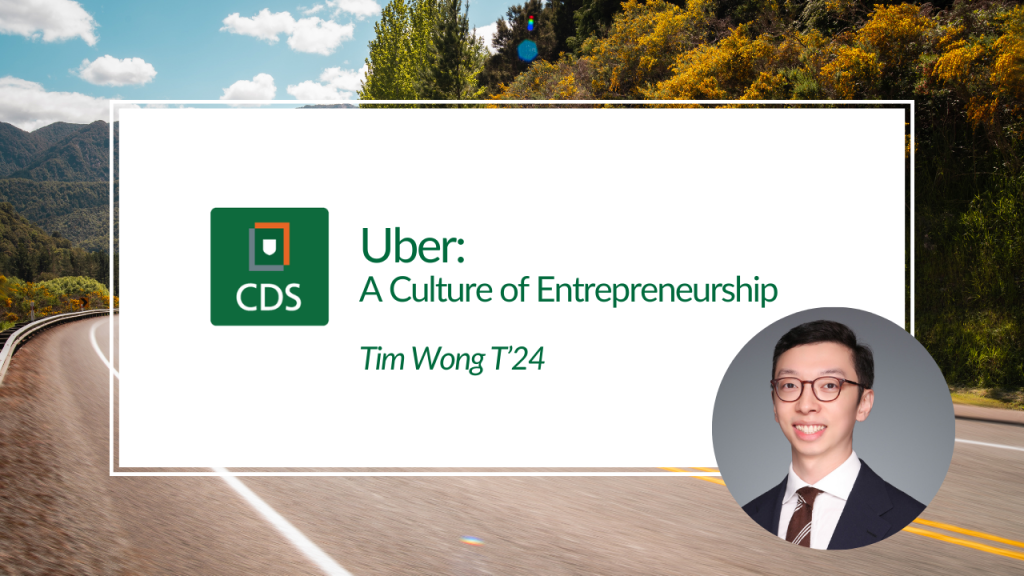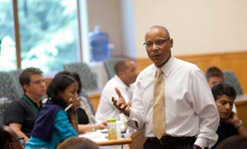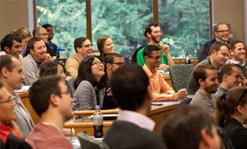Own Your Personal Brand
April 14th, 2017Topics: Culture Entrepreneurial Tech Operations Social Talent & Workforce

Keep Perspective When Your Career is in Transition, and be a Champion for Others
In the fall of 2015, I found myself navigating a long winding descent on my road bike in southern Tuscany. In the photo with this article, I’m standing at the gate of the village atop that mountain, on that day. I was riding with a dear friend and classmate from Dartmouth’s Tuck School.
Just as we had talked about our goals while riding our bikes to Tuck 30 years earlier, we got into a conversation about when we wanted to wind our corporate careers down. Perhaps it wasn’t the safest moment to have that conversation, but it turned out to be a watershed event for me.
The Decision
By the time I reached the bottom of the mountain, a “retire so you can rewire” vision was already forming in my head. I knew it was time to end my decades as a corporate leader, and to focus 100% of my time on the parts of my work that brought me passion, without the – at times numbing – tasks and politics of corporate life.
My wife and I hired a fee-based advisor a month after we returned from Italy. We reviewed our financial situation from top to bottom – savings, income, taxes, estate plan – the works. There were tradeoffs, but it was doable. By the official retirement date, our kids would be out of college and started on their own careers. The “rewirement” plan was a go.
In a conversation with my boss early in 2016 I said aloud for the first time “I’m retiring in October when I hit my eligibility.” He and our CEO were great about it. While I admit that I panicked a bit and second-guessed my decision to several people, it was the right one, and off I went into this new adventure.
The Reaction
What I was not prepared for was how people would interpret and react to my decision.
The firm was undergoing a lot of changes, and because an active 59 year-old at the top of his game would never leave voluntarily, I was assigned the “retirement was just a polite cover-up for getting canned” card. I’m walking around all excited and feeling free to really do what I want, and people are giving me sad eyes and a reassuring pat on the arm. WTF I wondered!?
But then I realized just how much our career plays a role in our lives. Not only as a source of income, but also as a big part of our personal brand in society. Many people tend to be awkward around those in career transition, or those whose careers are not associated with traditional employment. People especially can’t fathom someone signing up for this uncertainty voluntarily! The awkwardness is partly because people lose an easy label and association for us when we are in transition, or no longer hold a traditional job.
I’ve met and spoken with dozens of people who had been through various types of career transition – both voluntary and involuntary. They cite experiences that come up quite frequently:
- People corner you in social gatherings and ask “what are you up to?” – meaning, do you have another job yet, or are you still flapping in the breeze outside the mainstream?
- Family members and friends question how hard you are working to find work.
- New people whom you meet often act awkwardly after hearing your career status.
- Former colleagues are often unsure how to interact with you now that you are on the other side of the ID badge sensor.
- Contacts and friends you reach out to for networking conversations are often hesitant and don’t follow-up.
- In short; people treat you as if somehow YOU changed, because your work did.
My Advice
How you handle these situations in your own career transition – both internally and publicly – is critical to your self-confidence. How you treat others who are in a career transition is one of the greatest opportunities to display your character.
For those in career transition, don’t let anyone – especially you yourself – assign you a victim card. You own your brand. Seize it and position it as you want it managed. Welcome the process of personal discovery, networking and career exploration that transition brings. A career timeout can be a gift that allows you to relook your priorities and goals. Even money worries can make you a better budgeter and help distinguish between needs and wants with more clarity.
When you hear questions and comments like those listed earlier, look people dead in the eye and set them straight with confidence that there are no victims here. Without the label of your job, your personal brand and your character have a chance to stand on their own. Embrace that. It’s who you really are.
For those who are contacted by someone in career transition, return their call first. Everything about that person while they were employed is still true now. They are still funny, smart, creative, honest, talented, and able to create and deliver value. Treat them that way. Ask them how you can help, and diligently follow-up on the conversation.
You cannot imagine how powerful that embrace can be. You also never know what that contact can do in return down the road, whether through a business lead or a personal favor. Being a supporter and resource to those in transition is a great way to demonstrate and strengthen your personal brand, and to display your true character.
The Journey
As for me, I’ve started building my “rewirement” plan as I had envisioned it on that Tuscany ride. It’s still a work in progress, but I’m giving very well-received keynote talks on the challenges of digital and brand transformation. I’m also consulting and coaching other leaders on these issues, writing articles and a book, doing some academic work, mentoring and coaching over a dozen colleagues and associates, and networking and working with amazing people – from academics, to start-up entrepreneurs, to the leaders of huge firms.
People who have seen me speak, or who met me at a conference, or who were intrigued by my Linked-In profile, have reached out to me and offered opportunities to connect and grow. Tuck has invited me to reconnect in new ways as an Executive Fellow and Alumni Advisor. It has been more than I expected, and wonderful.
I also get to ride my bike almost every single day. I put under 10,000 miles a year on my car, and over 5,000 miles year on my bike. Given what happened on that mountain in Tuscany, I’m excited to see what it inspires next.
Thanks for listening.
Originally published on LinkedIn.











